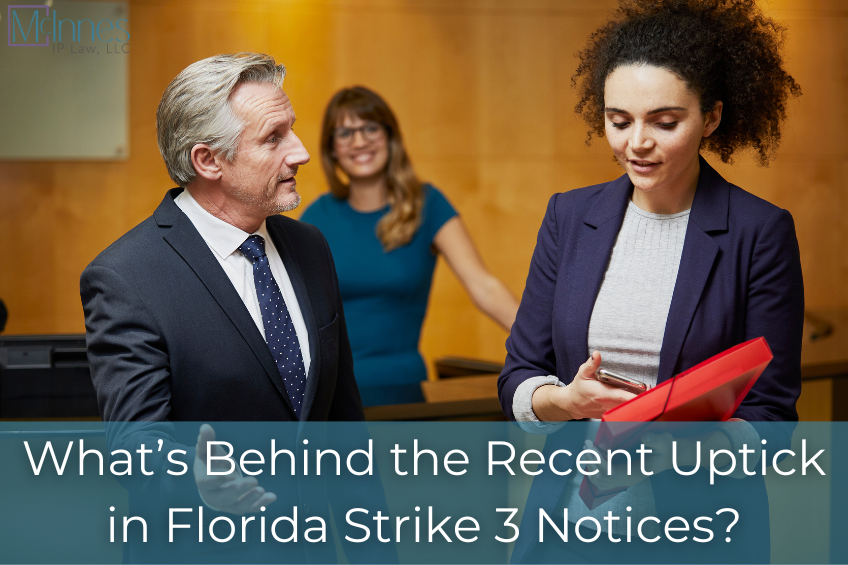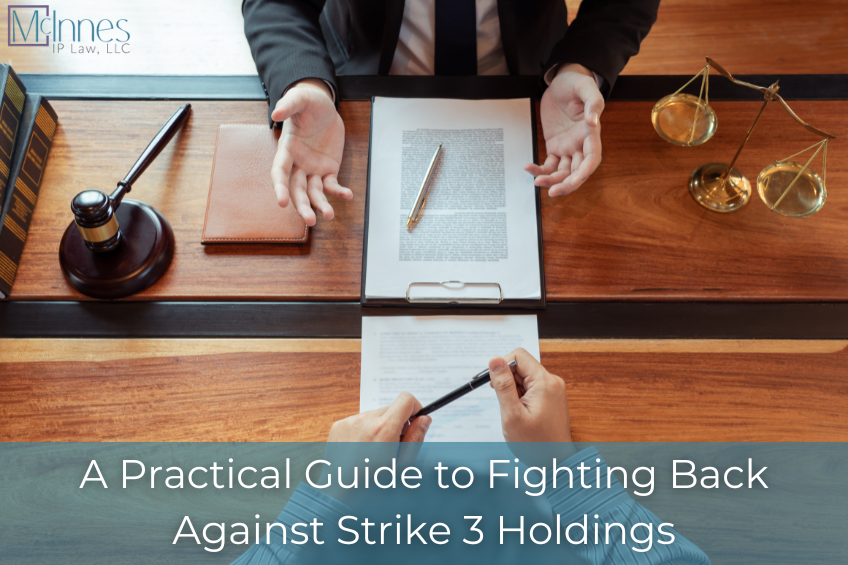Suppose you’ve recently received Strike 3 notices from your internet service provider about a subpoena related to BitTorrent downloads. In that case, you’re not alone—and if you’re in Florida, you might be dealing with something very different than the typical copyright lawsuit. Florida has become ground zero for an aggressive legal strategy used by Strike 3 Holdings, the adult film company behind thousands of copyright infringement cases across the United States.
What sets Florida apart is Strike 3’s use of a unique legal tool called a “pure bill of discovery” in state court. This method has allowed the company to cast a wide net and pursue alleged infringers in a way that’s more cost-effective for them, but far more confusing for defendants.
This blog will help you understand how this approach works, what it means for individuals targeted by these actions, and why it’s critical to respond quickly and carefully.
What We’ll Cover:
- Defining the “pure bill of discovery” approach
- Real-world examples
- A surge in federal court filings
- What Strike 3 notices mean for defendants
- Why ignoring Strike 3 notices can be costly
- Options for legal defense
- Precautions for Florida residents
- Key takeaways
- Legal representation
The “Pure Bill of Discovery” Approach
Most copyright holders, including Strike 3 in other states, typically file individual federal lawsuits against unnamed defendants, usually identified only by their IP addresses. Once the suit is filed, they subpoena ISPs to obtain the real names and addresses of these users. After that, they often offer a settlement or proceed with litigation.
In Florida, Strike 3 has taken a different route.
Rather than filing hundreds of separate lawsuits, they file a single petition in state court using Florida’s “pure bill of discovery”—a rare and historically narrow legal tool. This process allows them to ask the court for permission to subpoena ISPs without immediately filing a formal lawsuit. Once they receive subscriber information, they can then decide whether to pursue each individual in federal court.
This approach offers Strike 3 several advantages:
- Cost Savings: By consolidating dozens—or even hundreds-of IP addresses into one case, they avoid the hefty filing fees associated with federal court.
- Efficiency: Rather than managing hundreds of separate dockets, they only need to manage one case in state court to unmask numerous individuals.
- Anonymity Pressure: Once defendants are identified, the threat of public exposure in a federal lawsuit can push many into settling quickly.
Real-World Examples of Strike 3 Notices
In 2020 alone, Strike 3 filed 47 state court actions in Miami-Dade County, each targeting multiple defendants. Together, those cases reached more than 2,500 individuals—a massive scale made possible by the pure bill of discovery tactic. While the state court tactic helps Strike 3 identify individuals, the real legal battle often happens later, when they file federal lawsuits.
A Surge in Federal Court Filings
In the first half of 2024, Strike 3 filed 41 federal lawsuits in the Middle District of Florida alone. These suits typically allege that individuals used BitTorrent software to illegally download and distribute their copyrighted adult content.
Once the federal suit is filed, the court issues a subpoena to the relevant ISP, ordering it to turn over the name and address of the account holder associated with a specific IP address at a specific time. This step is often when unsuspecting individuals first learn they’re being accused of copyright infringement.
What Strike 3 Notices Mean for Defendants
If you’ve received a notice from your ISP about a subpoena from Strike 3 Holdings—or worse, a letter saying you’ve been sued—it’s understandable to feel anxious or overwhelmed. But here’s the most important thing to remember: These Strike 3 notices are not a scam. It’s a legitimate legal action. And it won’t go away on its own.
Do You Need Legal Representation Against Strike 3 Holdings?
Ignoring Strike 3 Notices Can Be Costly
If you do nothing, Strike 3 notices can lead to a default judgment against you. These judgments can include significant financial penalties, public exposure, and even wage garnishment or liens in some cases. Some people believe that deleting files or changing behavior will make the problem disappear. Still, once an IP address links to an alleged infringement, the legal process has already begun.
You Have Options
The good news is that you do have legal options, and time is critical. Here’s what you can do:
- Consult an experienced attorney: Not all lawyers are equipped to handle copyright infringement or IP cases. Choose someone who regularly works on Strike 3 cases and understands both federal and Florida state court tactics.
- File a motion to quash: In some cases, it may be possible to challenge the subpoena before your identity is revealed.
- Negotiate a settlement: A lawyer can help you resolve the matter quickly, often anonymously, before your name ever appears in public court records.
- Mount a defense: If you didn’t download the material, or if the IP address doesn’t correspond to your actions, you may have a solid defense. Strike 3’s evidence isn’t always airtight.
Why Florida Residents Should Be Especially Cautious
Florida’s dual-court approach—first unmasking defendants in state court and then suing in federal court—makes it one of the most complex and aggressive jurisdictions for these cases. Additionally, Florida courts are familiar with Strike 3’s tactics and may be less sympathetic to uninformed or unrepresented defendants. That makes it all the more important to respond quickly and strategically.
Key Takeaways
-
Florida is different. Strike 3 often uses a pure bill of discovery in Florida state court to subpoena ISPs and identify subscribers before filing individual federal lawsuits.
-
This approach is efficient for Strike 3. Consolidating many IP addresses into one state filing can reduce filing fees and streamline the unmasking process.
-
A follow-on federal case is common. Once Strike 3 obtains subscriber information, it may file separate federal lawsuits tied to specific IP addresses and timestamps.
-
ISP notices are legitimate. A subpoena notice is a real legal process, not a scam, and it will not resolve itself if ignored.
-
Doing nothing can escalate risk. Missed deadlines can lead to identity disclosure, reduced leverage, and potential default judgments with serious financial and reputational consequences.
-
Early action preserves options. A qualified attorney can evaluate the claims, advise on strategy, and protect your position before your name becomes public.
-
Possible defenses exist. IP-address evidence does not always prove who downloaded anything, and technical and factual issues can affect outcomes.
-
Settlement may be handled discreetly. In many cases, counsel can negotiate a resolution that emphasizes confidentiality and limits public exposure.
Contact McInnes IP Law for a Confidential Case Review
At McInnes IP Law, we specialize in helping individuals respond to and resolve Strike 3 notices. We’ve handled many of these cases nationwide, and we understand the unique procedural landscape in Florida, including:
- Navigating the pure bill of discovery process in state court
- Strategizing around anonymous settlements
- Filing motions to quash or dismiss subpoenas
- Representing clients in federal court if a lawsuit proceeds
We are here to protect your rights, your reputation, and your peace of mind. Call us at (774) 234-1256, email us at info@mcinnesiplaw.com, or message us on our LinkedIn Company Page.
Disclaimer: This blog is for informational purposes only and does not constitute legal advice. Every case is different. For specific guidance, consult an attorney experienced in copyright law.



